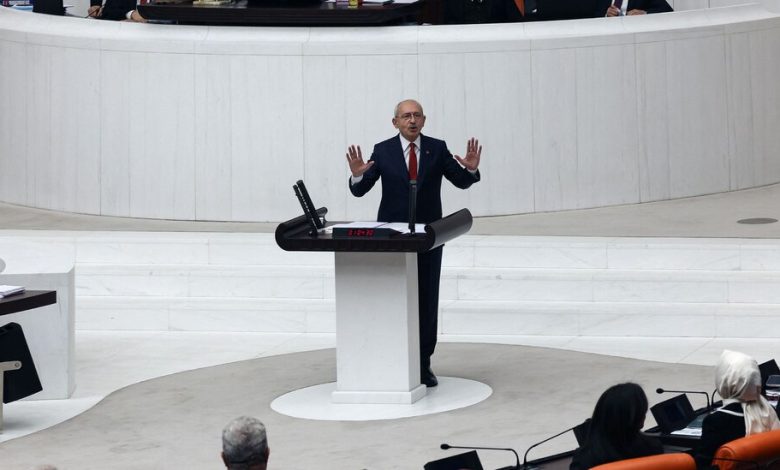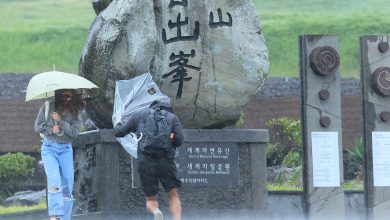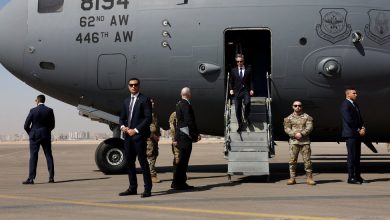A Rival for Erdogan Emerges as Opposition Parties Pick a Candidate

ISTANBUL — A coalition of parties seeking to unseat President Recep Tayyip Erdogan of Turkey anointed a veteran opposition politician on Monday as its presidential candidate just two months before elections that could drastically alter the country’s political and economic trajectory.
The candidate, Kemal Kilicdaroglu, the head of Turkey’s largest opposition party, represents diverse political forces that have vowed to reverse what they call Mr. Erdogan’s erosion of democracy as he has consolidated power during two decades as the country’s paramount politician.
At stake in the simultaneous presidential and parliamentary elections, which Mr. Erdogan has said will be held on May 14, is the economic future of Turkey, one of the world’s 20 largest economies. It is also a United States ally in NATO with a wide array of economic and diplomatic ties stretching across Africa, Asia, Europe and the Middle East.
In the last year, Turkey has played a key role in diplomacy surrounding the Russian invasion of Ukraine, with Mr. Erdogan meeting frequently with other NATO heads of state as well as with President Vladimir V. Putin of Russia.
Whoever wins Turkey’s presidential race will be charged with fixing the economy, which left Turks struggling with inflation as high as 85 percent last year, and overseeing the government’s response to a powerful earthquake that struck the country’s south on Feb. 6, killing more than 46,000 people, destroying hundreds of thousands of buildings and displacing more than 3 million people. More than 6,000 were also killed across the border in northern Syria.
Deadly Quake in Turkey and Syria
A 7.8-magnitude earthquake on Feb. 6, with its epicenter in Gaziantep, Turkey, has become one of the deadliest natural disasters of the century.
- Near the Epicenter: Amid scenes of utter devastation in the ancient Turkish city of Antakya, thousands are trying to make sense of an earthquake that left them with no home and no future.
- Builders Under Scrutiny: The deadly quake in Turkey has raised painful questions over who is to blame for shoddy construction and whether better building standards could have saved lives.
- ‘A Strange Dream’: More than 1,000 Turkish residents displaced by the recent earthquakes have found shelter on a 538-foot luxury boat in the Mediterranean Sea.
- Upcoming Elections: The earthquake’s vast destruction will present challenges to the organization of Turkey’s presidential and parliamentary elections. But President Recep Tayyip Erdogan said that he did not intend to delay the vote.
Mr. Erdogan, who is seeking a third presidential term after a long stint as prime minister, has billed himself as the best person to lead Turkey into its second century, a reference to 2023 being the 100-year anniversary of the foundation of modern Turkey after the collapse of the Ottoman Empire.
His critics see the election as a prime opportunity to remove him from power, accusing him of damaging Turkey’s democracy and harming its economy by pushing the country toward authoritarianism.
“My beloved people, we will run Turkey with consultation and consensus,” Mr. Kilicdaroglu said in brief comments to a large crowd of supporters in the capital, Ankara. “Our greatest aim is to bring fertile, peaceful and cheerful days to our country.”
Mr. Kilicdaroglu and the opposition he represents face significant challenges in their quest to defeat Mr. Erdogan, a skilled politician who can count on a large, well-organized party infrastructure and who can wield the apparatus of the state to promote his message.
The opposition has struggled to project unity, raising questions among some voters about how effectively its members can work together. The coalition, known officially as the Nation Alliance and unofficially as the Table of Six, includes six parties that range from right-wing nationalists to political Islamists to staunch secularists.
The difficulties in holding them together spilled into the open on Friday when the right-wing nationalist Good Party, the coalition’s second-largest member, publicly left the coalition because it did not agree that Mr. Kilicdaroglu should be the candidate, throwing the opposition into disarray.
Declaring that the coalition “no longer represents the people’s will,” the Good Party’s leader, Meral Aksener, appealed to the mayors of Ankara and Istanbul, Turkey’s largest city, to run against Mr. Erdogan.
Both men are members of Mr. Kilicdaroglu’s Republican People’s Party and are more popular with voters than he is, according to recent polls. But the two mayors publicly rebuffed Ms. Aksener’s call, leading to a flurry of meetings between opposition leaders over the weekend.
Late Monday, it appeared that the coalition had resolved its differences, at least for now. After a meeting of party leaders in Ankara, they officially named Mr. Kilicdaroglu as the opposition’s candidate.
In his remarks, Mr. Kilicdaroglu said that the leaders of the other five opposition parties would be his vice presidents — a potentially unwieldy effort to keep all the members on board.
The opposition has stated that it plans to return Turkey to a parliamentary system, undoing a switch to a presidential system that Mr. Erdogan used in 2018 to drastically expand his control of the state.
Mr. Erdogan appeared to relish the opposition’s disarray, telling reporters on Saturday that he was solving Turkey’s problems while his opponents were busy fighting among themselves.
“We are concerned with lives, they are concerned with property,” he said, using an idiom that rhymes in Turkish. “There is an earthquake in Turkey — a disaster of disasters. I want to put my people back in homes at once.”
The official election date has not yet been set, but Mr. Erdogan told reporters on Monday that he would start the process on Friday to make it May 14.
He planned to issue a presidential decree that would facilitate voting for those displaced by the earthquake, he said.




